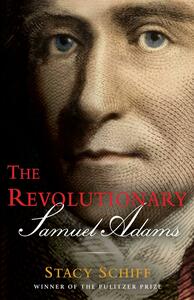Take a photo of a barcode or cover
slow-paced
This was a painful read. I can confidently say I will not read a book from this author again.
adventurous
funny
informative
medium-paced
challenging
informative
inspiring
slow-paced
adventurous
challenging
informative
inspiring
reflective
medium-paced
Stacy Schiff has always done a masterful job at writing about people whose lives shaped world history, but about whom little is concretely known by me. She returns with another great piece, this time about Samuel Adams, who is not just a name slapped on a beer label. Schiff explores the man and his importance to colonial America, outside of simply being one of those men bandied around when mention of Washington, Jefferson, and Revere enter the conversation. Great storytelling and a keenness to provide little known facts help Stacy Schiff stand out from others who seek to pen great biographies.
Samuel Adams lived his early years in Massachusetts, under the tutelage of parents who taught him right from wrong. His passion always appeared to lay with educating himself, though the mid-19th century did not permit too many options for a poor family. Still, Adams was able to secure a spot at Harvard College and excelled in his studies, ruminating over what his thesis ought to be, while others pondered more mundane topics. This passion to learn and express himself showed the early signs of the man he would become in the American colonies.
After marrying Elizabeth Checkley, Adams knew that he would have to make a name for himself, or at least find a way to provide for his family. Adams became a collector of debts, making sure those who were behind faced swift retribution. As Schiff mentions, the irony that Adams could get monies from others and yet fell deeply behind in his own debt repayment is not lost on historians. Adams did as well as he could, especially as his family continued to grow. However, tragedy did not pass him over, as Elizabeth died not long after one of her numerous stillbirths, an event that shook Adams to his core.
While Samuel Adams was once again a bachelor, he caught the eye of a second woman, someone who appeared to be the perfect match for the young Adams. Schiff pulls on some commentary by Samuel’s cousin, the famed John Adams, who cited that Elizabeth Wells was just the type of woman Samuel deserved and it appears that later letters between the two would show just how in love they were with one another. It was around this time that things in the Massachusetts colony began to get more intense, as Britain passed the Stamp Actand would soon expect not only stamped insignias of the Crown on all published documents, but a tax to be paid to the Crown. Calls of ‘no taxation without representation’ began to echo through the streets across the colonies, though Massachusetts appeared more willing to appease the Crown than others. Adams noticed the sentiment against the British growing and could feel that something was on the horizon, though it had yet to foment into full rebellion.
While Adams wanted to keep the calm, he knew that the British were upping the pressure and trying to press the colonies to become even more subservient. Schiff mentions around this time that Britain had not taxed the colonies before because of their ‘infancy’ but that the time was right to do so. One can only surmise that this lit a fuse under many, both within and outside Massachusetts, which starting creating added animosity and tension. British soldiers, the embodiment of the London Government, became the target of attacks, at which time they retaliated. There are numerous mentions in the text at this time about skirmishes and how Adams was there, even if he was not firing or tossing stones. Animosity was building and it was only so long before it would boil over completely.
Adams’ ability to write and communicate made him a precious commodity when the colonial leaders wanted to express themselves. As Schiff explores, Virginia was the centre of the colonial attempts at rallying to unite, but Massachusetts had strong-willed individuals who would be perfect for the cause, Samuel Adams being one of them. He was spoken of fondly by his cousin, but could also be said to possess his own character worthy of being remembered. Samuel Adams came to realise that the colonies were no longer being respected by Mother England or the Crown, but rather treated as a toddler and kept under thumb. There was talk of considering pushing away, especially when not given a chance to speak or participate in debate over issues that would regularly affect those in the colonies, as well as trying to etch out a set of rules by which colonial residents would live with their own governing body, albeit local and loosely enforced. When Britain scoffed at any independence or voice for the colonies, Adams and his compatriots knew something was in the air. Add to that, England was still pushing taxation and high fees on colonial residents while refusing to let them have a say at the bargaining table.
In an intense progression through the latter portion of the book, Schiff shows how the animosity between the British and colonies, with Adams in the middle of the fray. While colonial leaders knew they could not back down, they would have to play it safe or risk being crushed. Adams and some of the other leaders were able to create a tension amongst locals against the British, such that there was no question of relenting. As the narrative builds, Schiff shows how Adams grew into his “revolutionary” moniker honestly, as he rallied everyone to the need for British remove and the yoke of oppression to be cast off. While it would not be swift, it was necessary and proved to be one of Adams’ greatest moments, using great oratory and written documents to light a fire under those who had the ability to bring about change. From pushing the British to surround Boston for a massacre in 1770 through to the Tea Party in 1773, Adams is said to have been instrumental in building up animosity through is writings. While I could go into great detail, I prefer to let the reader delve into the detail Schiff provides here, which only adds to the moment. When the dust settled, a new republic, albeit still trying to find itself, could be said to have emerged; a united group of colonies who would call themselves states!
While the book proved to be an attempt to cram a significant amount of history into a single document, Stacy Schiff did so effectively and with great passion. Samuel Adams came to life and emerged as a hero, both for the colonies and for Massachusetts specifically. Throughout his life, Adams used his passion for expression and some key political connections to make his mark, staring down the oppression of the British and stopping only when the final result worked in his favour. Schiff builds each chapter on the last and provides a strong narrative to push the reader along. Great anecdotes pepper the tome, giving those with a basic understanding of American history better context, while educating those, such as myself, who are clueless to all but the most basic aspects. Easy to comprehend but still detailed enough to provide needed context for those who want something with depth, Schiff has done it again. She takes a great approach to the Boston Tea Party, something that I knew only about in passing, and puts it into a great context to better understand how this could be seen as one of the pivotal moments in the revolutionary movement. She builds on the clash between the Massachusetts colonists and the English, which was surely a microcosm to the larger colonial struggle. Adams found himself in the middle of it, at least as a spokesman for the colonial position on the matter. When protests turned violent, Adams may not have drawn up the specific plans, but he surely did not distance himself from the acts, feeling that there was a sense of justification in the destruction as a symbol of tossing off the yoke of English control. This proved to be one of the final acts of aggression that fuelled the move for independence by the colonies.
Kudos, Madam Schiff, for dazzling in this account and proving once more you are a historian who cares about educating the common reader.
Love/hate the review? An ever-growing collection of others appears at:
challenging
informative
slow-paced
I enjoyed this book and recommend it. I took a deep dive into John Quincy Adams biographies a few years ago (He is my favorite president and I've always been interested in him and his family). I am a history major; I took several courses focusing on Colonial and Revolutionary history in the US.
I particularly enjoyed, as I read the book, comparing what I knew of Samuel Adams from the JQA biographies and other history, to the book's description - and, comparing the personality traits and ideals of Samuel Adams to those of his cousins. They definitely had approaches, perspectives, and values in common!
That said: if you're not pretty familiar with Colonial and Revolutionary history, you may want to be ready to pull up some internet resources as you read about some of the events and individuals in the book - so you can better situate and understand what's described. And, you may want to keep a running list of how various individuals connect to them (allies, enemies, acquaintances, and shiftings thereof). I don't want to scare anyone off, the book is important and a good read, you just may enjoy and understand it better if you're ready for that.
I was repeatedly struck by how some of Adam's tactics resemble some of the dangerous things we see in our politics today (disinformation etc.). I think the difference is motivation and end goal, but it still gives one pause.
I particularly enjoyed, as I read the book, comparing what I knew of Samuel Adams from the JQA biographies and other history, to the book's description - and, comparing the personality traits and ideals of Samuel Adams to those of his cousins. They definitely had approaches, perspectives, and values in common!
That said: if you're not pretty familiar with Colonial and Revolutionary history, you may want to be ready to pull up some internet resources as you read about some of the events and individuals in the book - so you can better situate and understand what's described. And, you may want to keep a running list of how various individuals connect to them (allies, enemies, acquaintances, and shiftings thereof). I don't want to scare anyone off, the book is important and a good read, you just may enjoy and understand it better if you're ready for that.
I was repeatedly struck by how some of Adam's tactics resemble some of the dangerous things we see in our politics today (disinformation etc.). I think the difference is motivation and end goal, but it still gives one pause.
slow-paced
Bought for the #governerdsbookclub but I just couldn’t get into it. Fortunately my husband finds it interesting. US History was my least favorite subject in school ~ I guess nothing has changed.
informative
reflective
slow-paced
Really hard to follow the audiobook & I'm not about to try the ebook or hardcover. Based on other reviews about lack of coherence & structure & difficulty tracking who the author is talking about at any given time, I won't waste any more time trying with this book.
informative
medium-paced




